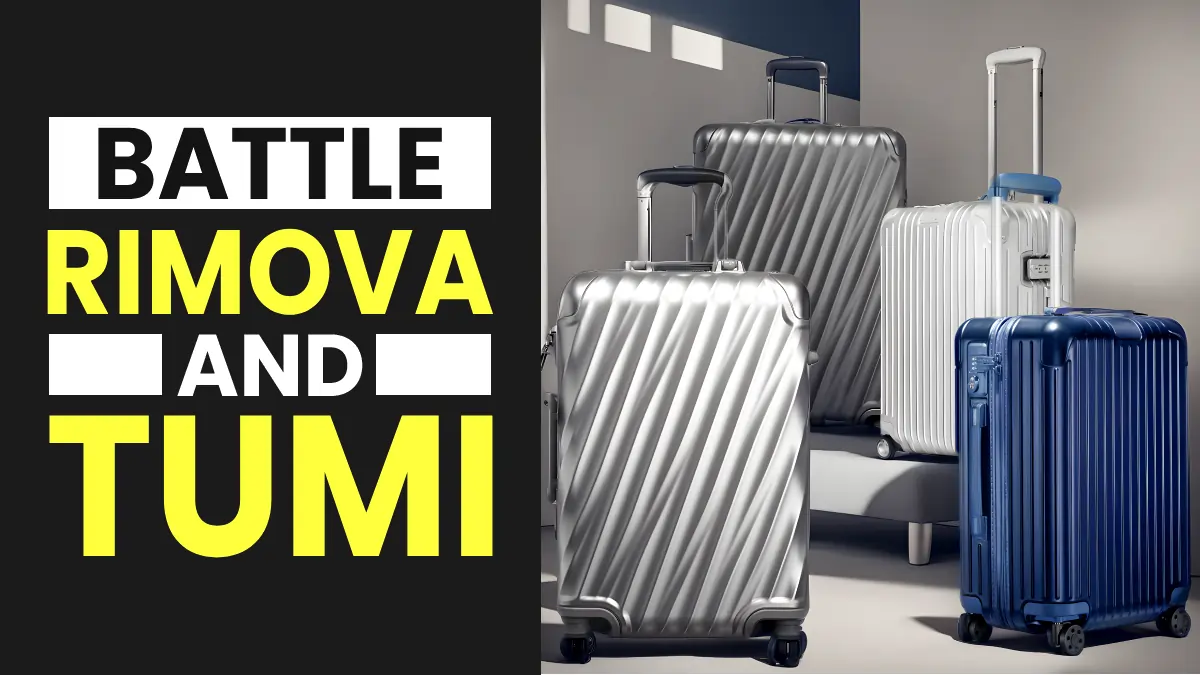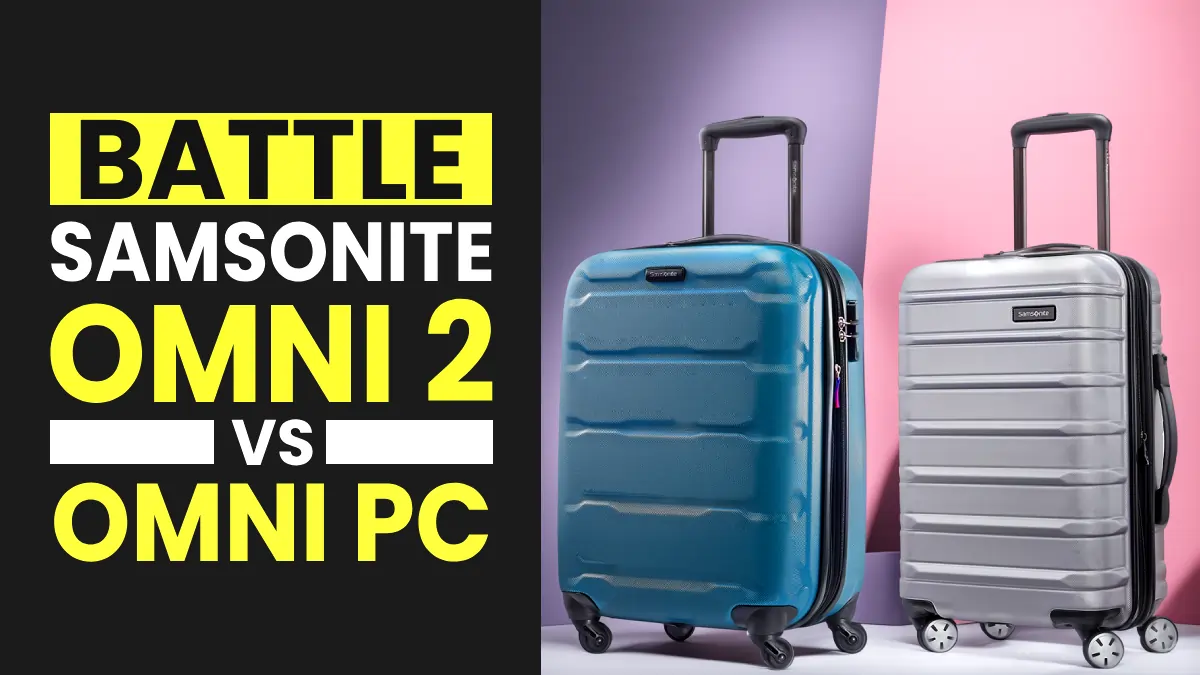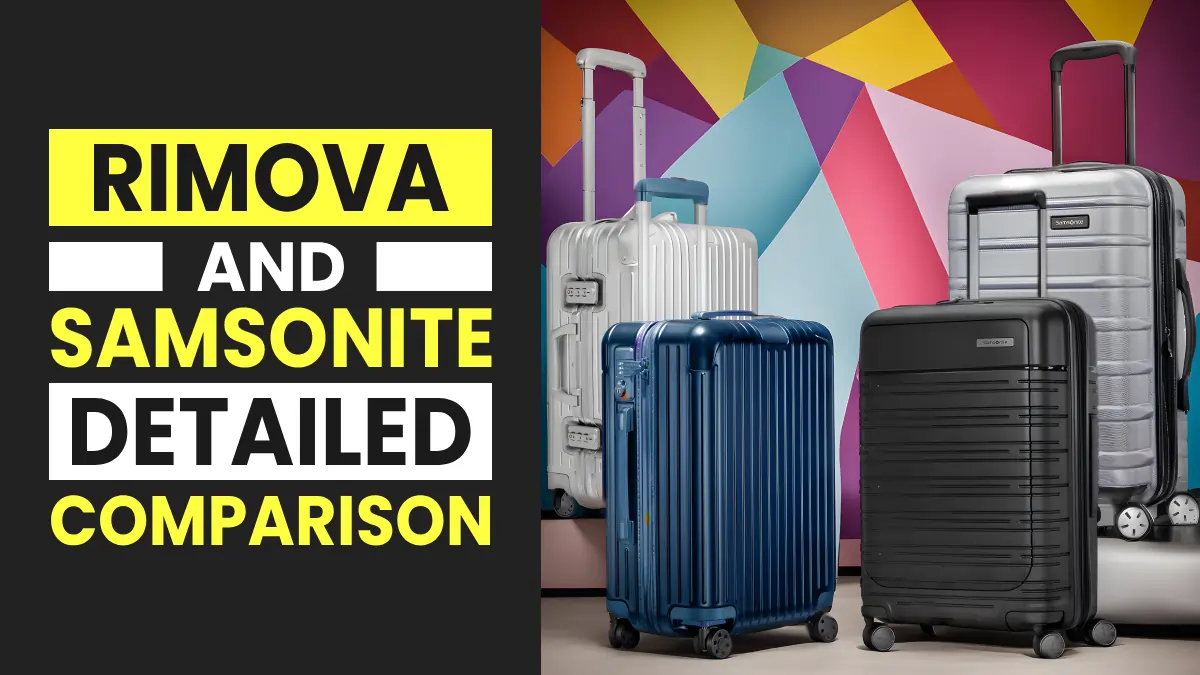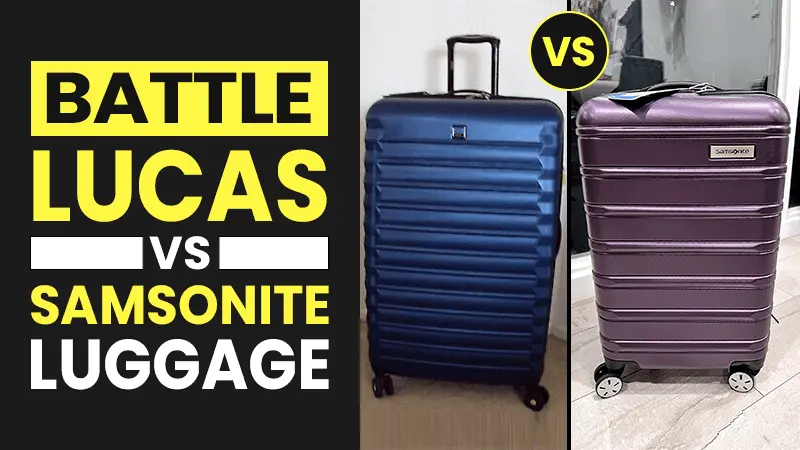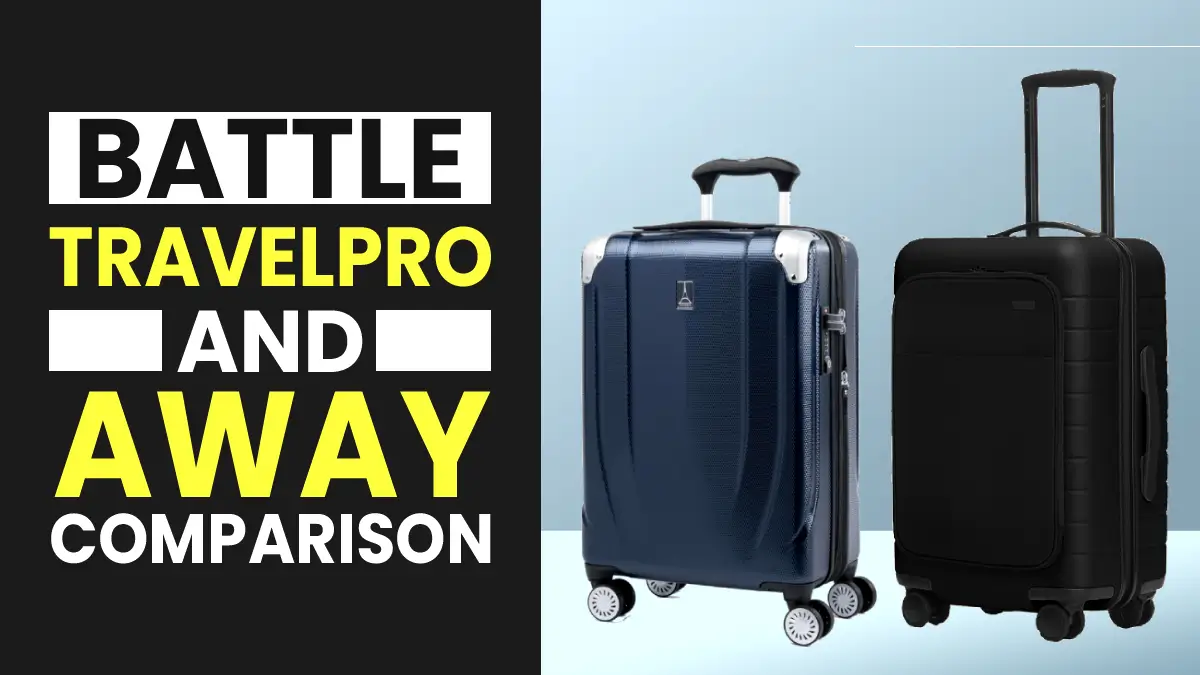Rimova vs Tumi: Which Brand Is Perfect for You in 2026?
Rimova and Tumi are both well-known luggage brands, especially for their aluminum suitcases. They are considered among the premium and most expensive luggage brands. Initially, they became popular for their aluminum suitcases, but with time, they started manufacturing polycarbonate and softside suitcases too.
You’re confused and want to know which one of the two brands you should choose, as both seem to be the same in terms of durability, weight, and performance, but in my opinion, when it comes to features and warranty, there are some considerable differences that will surely impact your decision.
In this guide to Rimova vs Tumi, we’ll compare both brands on different parameters, including durability, features, weight, airline regulations, and warranty, so that you can decide which one to choose from.
A Quick Overview of Rimova and Tumi Luggage Brands
About Rimova
Rimova has been in the luggage industry for more than 100 years, even before the establishment of the Samsonite brand. They’re still in the race and making extremely durable suitcases according to the demands of this modern age.
It was established in 1898 in Germany and started with the manufacturing of aluminum suitcases. Even today, they’re very well known for their aluinum suticases. However, today, they offer some quite durable plastic luggage options too.
Till 2016, the company had been in the hands of its original owners, but later on it was acquired by one of the biggest luxury brands, Louis Vuitton, which is known for its luxury and expensive products.
Today, Rimova manufactures not only suitcases but plenty of other products as well, such as backpacks, totes, and other travel accessories.
About Tumi
Tumi is also one of the oldest brands, but when compared to Rimova, it’s newer and was established in 1975 in the United States. Tumi is also among the most premium and expensive brands and focuses on making suitcases, especially for frequent and business travelers.
They started off with making the most durable softside suitcases utilizing ballistic nylon, and now they not only make softside suitcases but also hardside suitcases, including polycarbonate and aluminum materials.
The most important thing that you might not be aware of is that Tumi is now owned by Samsonite, which is now the most popular and biggest brand in terms of sales. In 2006, Samsonite acquired it, and since the merger, the brand has been doing even better and is listed among the best-performing brands.
Now they have expanded the range of products and included backpacks, duffel bags, totes, and other travel gear to meet the requirements of each traveler.
Benefits and Drawbacks of Rimova
The Good
- Extreme Durability: Rimova stands first in terms of durability; their suitcases are extremely durable because, for hardside luggage, they use aluminum and polycarbonate, which is the most durable material, and for softside luggage, they always prefer full-grain leather and canvas,both of which are really durable and long-lasting.
- Follow the Airlines Restrictions: Rimova took care of everything and designed their suticases in such a way that all of their suticases follow the guidelines of almost every airline for carry-on and even for checked luggage.
- Premium and elegant design: Rimova suitcases are really unique in their appearance and give them a unique identity. They always try to come up with a sleek and modern look. Initially, they used to offer only silver-colored luggage, but now they’ve included different color options like orange, green, gray and white.
- Lifetime Warranty: Rimova used to provide a warranty for only five years, but since July 25, 2022, they started offering a lifetime warranty. The important thing is that they only cover manufacturing damage, but at this price point, in my opinion, they should provide an unconditional warranty for at least five.
- Customers’ Reviews: Rimova gained good reviews, especially for their durability. We could hardly find any reviews complaining about the material and durability. However, there are a few negative reviews about customer service and delivering different colors.
The Bad
- Overpriced: Their luggage is really expensive; I’d say they’re extremely overpriced. The average price of Rimova luggage is around $1200, which should be reduced to $500 to $600.
- Lack of Additional Features: At this price point, we expect everything in their luggage, but they do offer essential features like TSA lock, dual spinner wheels, an adjustable handle and a flex divider. They should also include some additional features like a GPS tracking system and a USB charging port.
Benefits and Drawbacks of Tumi
The Good
- Excellent Build Quality: Being a premium brand, Tumi is also equally durable like Rimova; they also use polycarbonate for their hardside luggage, and for their softside luggage, they use ballistic nylon, which is even more durable than polyester.
- Follow the Arilines’ Guidelines: Tumi, similar to Rimova, also follows the guidelines of almost all the airlines for both carry-on and checked luggage.
- Packed with Essential Features: Their suitcases are equipped with all the features that you might need during your travels. These features not only include the TSA lock, expansion, and adjustable handle, but also some additional features like laptop compartments, suiters and a USB charging port.
- Premium Design and Appearance: Tumi Suticase is also sleek and minimalistic; their design is unique and they also introduced new color options like red, green, and orange instead of only silver and gray.
- Customers’ Reviews: On average, their suitcases are rated between 4 and 4.5 out of 5 stars. Similar to Rimova, we could hardly find any negative reviews about the durability of Tumi luggage.
The Bad
- Expensive: Tumi suitcases are not as expensive as Rimova, but they’re still expensive and overpriced. The price should be around $500; paying around $1000 is not justified, in my opinion.
- Not a Reliable Warranty: They used to provide a lifetime warranty, but after 2004, they stopped it. Now they’re offering a five-year warranty. For the first year, they cover everything with an unconditional warranty, but for the rest of the four years, they offer only a manufacturing warranty.
Also Related: Samsonite vs. Tumi: Which Is a Better Luggage Brand?
Main Differences: Rimova vs Tumi
Is Rimova luggage more durable than that of Tumi?
To be honest, it’s really difficult to differentiate and compare both brands in terms of durability, as both of them are really good and they make extremely durable suitcases. The important thing to note here is that we didn’t find any customer complaints about the durability of any of the brands.
Non-Flexible Hardside Suitcases
Both brands mostly prefer using aluminum and polycarbonate materials. Aluminum is the most durable material for hardside luggage; however, the biggest negative, as we mentioned above, is its heavy weight. Because they’re made of aluminum, they are very less likely to break or crack; they usually bend. So for aluminum luggage, both brands are equally durable and long-lasting.
Flexible Hardside Suitcases
Rimova always prefers polycarbonate, which is for now the most durable plastic material that is used in luggage, and Tumi also uses polycarbonate in most of their suitcases, but they sometimes go with Tegris, which is purely polypropylene, which is somewhat equally durable as polycarbonate but lighter. So in their plastic suitcases, there is not any considerable difference in terms of durability.
Softside Luggage, Backpacks, and Totes
Rimova generally uses full-grain leather and canvas, both of which are the strongest softside materials. On the other hand, Tumi uses ballistic nylon, which is less durable than full-grain leather and canvas but more durable than polyester, which most affordable brands like Samsonite use in their suitcases. Comparing softside products, such as luggage, backpacks, and totes, Rimova does slightly better in terms of durability.
Other Elements
When we compare both brands on other elements such as spinner wheels, handles, zippers, and locks, we’ve found that Rimova and Tumi are very close to each other, but if we compare in depth, we find that Rimova is slightly better at some places because Tumi sometimes uses solid plastic for elements like latches and handles, but Rimova always goes with matel.
Overall, both brands are neck-to-neck and equally durable; however, for softside products and luggage, Rimova is much better than Tumi.
Which brand makes lighter luggage: Rimova vs Tumi?
Rimova and Tumi both make the heaviest suitcases because they use aluminum, which itself is heavier. They want to make their luggage as strong as possible.
To fulfill this purpose, they use the most premium and durable material, and it comes with a heavy weight. That’s why their suitcases are much heavier compared to those of other brands. But when we compared both of them, we found that Rimova is slightly lighter than Tumi. Tumi is so much heavier that it sometimes becomes twice as heavy as some of the lightest plastic suitcases.
Another important factor that adds extra weight is the additional packing feature and high-quality wheels, zippers, and handles. They use the best material in the elements of suitcases, which end up adding to the total weight of the luggage.
So if you’re planning to fly with an airline that is tight with hand luggage, Rimova or Tumi are not the best choices for you. However, they can be used as checked luggage, as checked suitcases are supposed to be more durable so that they can withstand rough handling and difficult situations during transportation.
Summing up, Tumi is heavier than Rimova, especially when we talk about checked luggage, but with carry-on and underseat, the difference is minimalist. In terms of weight, Rimova is the clear winner by a slight margin.
Which one is more efficient at following the airlines’ size guidelines?
Rimova and Tumi both take the airlines’ restrictions seriously. That’s why most of the suitcases, including carry-ons and checked luggage, are below the size limits set by most airlines.
For carry-on, the most common size guidelines that most airlines follow are 22 × 14 × 9 inches, which is around 56 × 36 × 23 cm. We found that suitcases from both brands follow this guideline and fit within the limit. Mostly, Tumi makes their carry-ons exactly the same size, which is 22 × 14 × 9 inches.
For checked luggage, the most common size that most airlines follow is the 62 linear inches of luggage rule, which is nothing but the total length, width, and depth of your suitcase in inches. That means that your checked luggage should not exceed this limit.
Fortunately, both Rimova and Tumi always take it carefully and make their checked luggage while staying at 62 linear inches. So you don’t have any issues with any luggage. But still, make sure to measure the dimensions of the luggage before you buy it.
Which brand offers better features: Rimova vs Tumi?
In my opinion, when it comes to features, Tumi does a much better job than Rimova, even though Tumi costs less for their suitcases.
Rimova comes only with essential features such as luggage tags, dual spinner wheels, and TSA-approved locks. Apart from this, they also offer some smart packing features, like the flex divider, that help you keep your belongings in place during travel. On top of that, Tumi also provides enough organizational space for storing small items.
When it comes to Tumi, they offer all the essential features that Rimova offers, excluding the adjustable flex divider, but on top of that, there are plenty of other features that Tumi offers that can make your journey even more convenient.
Most of their suitcases come with expansion capability, which means you can increase the storage capacity of your suitcase by around 15%. The expansion feature is usually offered in zippered luggage, but Tumi went beyond that and offered this feature even in their aluminum luggage that comes with a latch system.
Beside this, if you’re a tech-savvy person, Tumi offers a USB charging system for you to keep your phone or tablet charged during travel, so you don’t need to rush to charging outlets at airports.
Similar to Tumi’s, another important feature that rarely comes in suitcases is their tracer system. On top of their luggage tag, they provide a 20-digit unique code on the exterior of the luggage. In case your luggage gets lost, airlines can approach Tumi, and with the help of that code, Tumi can find the details of the owner and can contact you.
Summing up, undeniably, Tumi is the clear winner in terms of features and convenience, even though it costs less than Rimova.
Which brand has gained more positive reviews: Rimova vs Tumi?
We researched the reviews of both brands; there were a few negative reviews, but most of the reviews were positive. We rarely found any reviews complaining about the durability of any of the brands. So durability is not a concern at all.
People often provide bad or negative reviews because they always expect to be perfect because they invest a hefty amount. So the expectations are very high. That’s not the case with affordable brands like Samsonite or Delsey; people have lower expectations and don’t want everything to be perfect. That’s why these brands have more positive reviews than these two.
In terms of reviews, both brands are very close to each other, and we couldn’t find any considerable difference in terms of reviews.
Warranty and Terms & Conditions: Rimova vs Tumi
Rimova now offers two types of warranties: one for five years and the other for a lifetime. Rimova offers a 5-year warranty for those suitcases that were bought before July 25, 2022, if registered online. If you didn’t register your product online, it’ll be covered only by a 2-year warranty.
On the newer model, Rimova now offers a lifetime warranty but covers only manufacturing defects. They don’t cover any defects caused by improper use, transportation, or normal wear and tear. In my opinion, Rimova should offer an unconditional lifetime warranty.
Another thing that you should be aware of is that the return shipping cost is covered by the brand, but the shipping cost will be borne by you.
On the other hand, Tumi’s terms and conditions are somewhat different. Tumi used to offer a lifetime warranty, but unfortunately, they ended it in 2004. Now, they offer only a five-year warranty but split it into two parts. For the first year, they offer an unconditional warranty, which means you’re totally covered. There’s nothing to worry about; whatever happens, they are going to fix it without any cost and even without any shipping charges.
For the subsequent four years, they offer a warranty that covers only manufacturing defects like Rimova. They don’t cover any damage caused by airlines, transportation, improper use, or normal wear and tear.
Do Tumi suitcases offer better value for money than Rimova?
Before we actually jump to the main evaluation, let me share that both brands are overpriced, in my opinion. This is not because they sell products; they sell brands. You’re paying so much in order to just get that brand logo on your suitcase.
| Parameters | Rimova | Tumi |
|---|---|---|
| Durability | 20/20 | 20/10 |
| Weight | 13/15 | 12/15 |
| Airlines Restrictions | 15/15 | 15/15 |
| Features | 12/15 | 15/15 |
| Review | 17/20 | 17/20 |
| Warranty | 12/15 | 10/15 |
| TOTAL SCORE | 89/100 | 89/100 |
That said, after taking everything carefully, we think that Tumi comes with better value than Rimova, especially when we compare these two brands. In terms of durability, weight, airline restrictions, and reviews, both brands are nearly close to each other.
But the main differences come with features and warranties. In terms of features, Tumi is the clear winner and Rimova is nowhere close to it, but on the other hand, Rimova offers a lifetime warranty if you purchase the luggage after July 25, 2022, while Tumi offers a 5-year warranty.
For Rimova, you’ll be paying around 13% to 27% more than Tumi, so you’ll basically be paying this additional amount just because of the lifetime warranty; otherwise, Tumi is a better choice in every aspect. So if you’re planning to have your luggage for a very long period of time or a lifetime, I think you should invest in Rimova and pay $155 to $215 more for the lifetime warranty.
If you want to replace your luggage after 5 years, Tumi is a better option to consider.
Closing Thoughts: Which brand should you choose?
Summing up, both brands do equally well in various aspects like durability, weight, airline restrictions, and reviews. The main difference between both brands lies in features and warranty.
Both brands use the best material for both hardside and softside suitcases. When it comes to weight, both the brands are quite heavy, but Tumi is even heavier than Rimova. In terms of size restrictions set by airlines, suitcases from both brands do equally well and have received equally positive and negative reviews.
When it comes to features, Tumi does far better than Rimova by providing the most advanced features in its luggage, while Rimova offers only the essential features, so in terms of features, Tumi is the clear winner.
But when we talk warranty, Rimova comes in front and now offers a lifetime warranty for those luggage purchased after July 25, 2022; on the other hand, Tumi offers a warranty only for 5 years. That’s the big difference between both brands. But in my opinion, at this price point, both of them should offer an unconditional lifetime warranty, or at least, an unconditional warranty for five years and a manufacturing warranty for lifetime.
So for Rimova, you pay around $155 to $215 more for the lifetime warranty and more luxury brands. So if it means a lot to you, Rimova is for you. But for those who are ready to change their luggage after 5 years, Tumi becomes a better choice.

